Occupy Central
Occupy Central is a civil disobedience movement which began in Hong Kong on September 28, 2014. It calls on thousands of protesters to block roads and paralyse Hong Kong's financial district if the Beijing and Hong Kong governments do not agree to implement universal suffrage for the chief executive election in 2017 and the Legislative Council elections in 2020 according to "international standards." The movement was initiated by Benny Tai Yiu-ting (戴耀廷), an associate professor of law at the University of Hong Kong, in January 2013.
Umbrella Movement
The Umbrella Movement (Chinese: 雨傘運動; pinyin: yǔsǎn yùndòng[1]) is a loose political movement that was created spontaneously during the Hong Kong protests of 2014.[2] Its name derives from the recognition of the umbrella as a symbol of defiance and resistance against the Hong Kong government, and the united grass-roots objection to the decision of the Standing Committee of the National People's Congress (NPCSC) of 31 August.
The movement consists of individuals numbering in the tens of thousands who participated in the protests that began on 28 September 2014, although Scholarism, the Hong Kong Federation of Students, Occupy Central with Love and Peace, groups are principally driving the demands for the rescission of the NPCSC decision.
The movement consists of individuals numbering in the tens of thousands who participated in the protests that began on 28 September 2014, although Scholarism, the Hong Kong Federation of Students, Occupy Central with Love and Peace, groups are principally driving the demands for the rescission of the NPCSC decision.
OCCUPY CENTRAL - DAY 74: Full coverage of the day’s events
Mapping out the protest sites for history
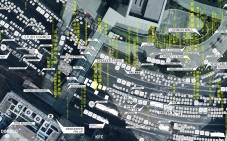
The spot where the tear gas was fired, the tent villages, the post-it note wall and study corner are all among the landmarks that will go into a mapping project aimed at documenting the growth of the Occupy Central sites.
A city divided
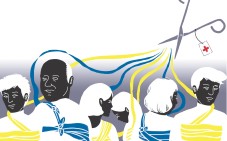
Take down your yellow or blue ribbon profile pictures from Facebook if you want to mend the deepening rift in society.
Hong Kong police now less popular than China's PLA, after Occupy clashes
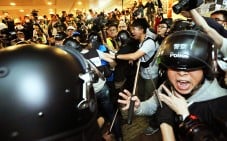
The police are the least popular among the main disciplined services in the city, and rank lower than the People's Liberation Army in terms of public satisfaction, according to a poll.
Students plan one last sit-in to mark the end of Occupy as clearance looms
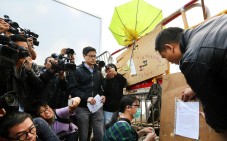
Student leaders at the core of the two-month-long Occupy protests say they will not put up any physical resistance to the police's clearance operation in Admiralty tomorrow.
Hongkongers take a last look round the main protest site in Admiralty
Every few steps, someone stopped to take a photograph.
Across the "umbrella movement's" Admiralty site yesterday, people milled around the tents and artwork on car-free highways for probably the last time.
As evening approached, the crowds swelled to thousands.
It had been 74 days since Occupy Central was launched and a sense of nostalgia was evident among those who visited on the eve of the police clearance. People paused to take pictures of everything - from the smallest "I want genuine universal suffrage" sticker on a pole to the gigantic yellow umbrella sitting on Tim Mei Avenue.
There were last-minute calls for signatures and speeches in support of Occupy - with a renewed fervour that had marked the beginning of the mass sit-ins on September 28.
Many had come because they heard the site was to be cleared. All wanted to remember this historically significant event.
"I want to record these things. I want to photograph everything here," said office clerk Wing Ng, 39, who had slipped from her office in the afternoon. "Seeing all these heartfelt messages, I'm very touched. It's emotional for me.
"Hongkongers have always been forgetful and selfish. But this is proof that we can change. I'm proud to be a Hongkonger."
With tears in her eyes, she added: "There is strength in unity. That is my favourite slogan seen here. I hope we will remember that."
As the visitors wandered around, protesters cleared their tents and volunteers packed piles of supplies into bags and boxes.
The artwork, however, will remain - the banners flapping from Tamar Bridge and thousands of post-it notes, by now inches thick on the "Lennon Wall" along Harcourt Road.
Protesters would still have access to supplies. Lau Yiu-man, 59, who was in charge of the supply station outside the Legislative Council Building, said the bulk of his items - mostly umbrellas, gloves and masks - would be moved to the area outside the British consulate on Supreme Court Road.
"I want to fight," he declared. "It was heartbreaking watching the beaten and bruised students in the past week, so I will fight."
Meanwhile, mixed-media artist George Wong, 31, sat outside his beautifully decorated tent depicting the four brick walls of a home in the four seasons.
Wong saw Occupy as a beginning and not an end of what would be a long-running movement for democracy.
"My tent, depicted as a house, signifies permanence - that the resolve to fight for democracy is a long-term unwavering movement, through all seasons," he said.
He said he would donate his tent to the Occupy Archive, a public initiative to preserve and record the wealth of creativity found in Admiralty.
Other protesters were also resolute, with many deciding to stay until the end and to continue to campaign for democracy.
"I'll be fixing things till the very end," said 69-year-old Uncle Chan, while hammering planks to make a new set of stairs to fit over concrete dividers.
Like many of the protesters, Chan had made new friends and cultivated a sense of community that he said he would miss.
Housewife and mother Ho Shiu-bik said she understood why the protesters were standing their ground until the end.
"They are doing this for all of us. They want to fight for a future of freedom and equality for Hong Kong."
This article appeared in the South China Morning Post print edition as A last look round main protest site
Hong Kong volunteers photograph and reclaim artworks ahead of police clearance of Admiralty protest site
The post-its. Photo: Dickson Lee
The headline-grabbing street art carrying some Hongkongers' hopes for democracy along Harcourt Road will be history once the police show up to clear Occupy protests in Admiralty today, but artists and creators vow to ensure the works continue to live on in new forms - virtually and physically.
Creators of the Lennon Wall - a site named after the late Beatle John Lennon - and artists archiving the protest-inspired artworks raced against time overnight to collect as many pieces as possible before the site is cleared.
Last night, Lennon Wall volunteers collected as many post-its as they could. They also took photos of each item - 13GB in all - for uploading on a website.
Allen Tang Wai-lun, one of the 10 core volunteers working on the Lennon Wall, said the iconic site made by tens of thousands of post-its stuck on a wall of the government headquarters will live on in cyberspace.
"We will rebuild the wall in the virtual space, allowing people to post messages," Tang said.
On another front, volunteers from the Umbrella Movement Visual Archives and Research Collective spent two nights collecting important creative objects that documented the movement.
Artist Sampson Wong Yu-hin, one of the core members of the archive, said more than 30 volunteers had worked overnight, collecting items such as banners, tents and makeshift staircases. He said there were plans to publish a book and create a website for future research purposes.
Artist and Polytechnic University design assistant professor Kacey Wong Kwok-choi, who is working on a digital archive of the artworks with other volunteers, said even though the movement did not achieve its goal of genuine universal suffrage, it showcased Hong Kong people's creativity when they are liberated by the freed up space at Occupy sites.
"There is no going back. The spirit of the movement will stay in people's hearts, just like the banner hung on Lion Rock," he said.
This article appeared in the South China Morning Post print edition as Volunteers photograph, reclaim artworks
The people behind Occupy
Why they joined Occupy, and what it means to them
For years, 42-year-old Alice Chan rarely took part in protests, citing a fatalistic belief that "Hong Kong is already dead". But that changed when police fired tear gas at Occupy protesters on September 28.
"When the Tiananmen crackdown happened, I was watching television. Images of the tear gas this time reminded me of watching the Beijing crackdown as a student," the office worker said.
"If I don't come out and fight for democracy this time, there won't be a second chance. The students are so young yet they have been at the forefront of the movement. As an adult I must come out too."
Soon after the Occupy movement started, 17-year-old Ng Kai-man quit her job as a waitress to become a full-time occupier. The secondary school dropout felt there was more to life than making money.
"I still have the rest of my life to make money. I needed to come out and contribute to help the city make democratic progress," said Ng, who has been helping out at a resource centre for protesters in Admiralty.
As protesters brace themselves for the clearance of their site today, Ng has been visiting Sham Shui Po to give away food donated to protesters to the homeless.
Gregory Lo was easy to spot among the predominantly young Occupy protesters. Now in his 70s, he joined the Occupy movement because of what he called police brutality and due to his discontent with the "incompetent" government.
"Leaving this place [Admiralty] does not mean that the fight for democracy is over. We have planted many seeds in terms of raising awareness. This movement is definitely a success," he said.
Sam Hui Kai-chun, a final-year nursing student at Polytechnic University, said the spirit shown by protesters during the Occupy movement had lifted his belief in Hongkongers.
"In the first one to two weeks, when there were a lot of people here in Admiralty, I felt like this place was a utopia. Everyone was so friendly and kind in helping each other out," he said. Hui, who has been working as a first-aider for the movement, said he could not believe police used batons against protesters.
After more than two months supporting the Occupy movement, media mogul Jimmy Lai Chee-ying said he is ready to be arrested.
"The most precious thing that came out of this movement is that Hong Kong discovered and woke up a whole generation that will continue the fight for democracy," he said. Lai said large-scale sit-ins or similar Occupy protests are not likely in the future. "It'll be hard to gather enough momentum and have enough organisation to do something this big again," he said. "I believe future actions will be a lot like the [Mong Kok shopping] movement, or the likes of it ... people stopping to tie their shoelaces in the middle of the street, people going shopping - very grass roots and ad hoc."
Oscar Lai Man-lok, spokesman for Scholarism, has been at the forefront of the Occupy movement. He said: "No matter how tired we have been, we have not given up on our fight for democracy. One of the protesters, Uncle Wong, is already very old and he has been here with us throughout. How can we say we are tired and give up?" he said.
He admitted that some of the group's strategies had not panned out as hoped, but every mistake they made was a learning process.
"An old protester once encouraged us by saying that we are still young, and that we need to keep learning and have faith in ourselves."

Since the Occupy movement started, head protest marshal Alex Kwok Siu-kit has not slept at home. But it has been worth it, he said.
"Democracy will not just come after a single campaign. But we have aroused the concern of many people on the matter," he said.
"I have gained so many happy memories here and have made many friends. Even after this movement ends, we will all stay in touch and remain friends."
Karen Ho Chui-ying, 28, recalled waking up one chilly morning outside the Legislative Council with somebody else's shirt laid across her.
"It was so cold that night. I woke up and found that someone had put a shirt on me," said Ho. "At that moment I felt so warm."
Mainland travel ban on protesters is 'burning bridges' with Hong Kong youth
Students denied entry to mainland over their involvement with protest movement say such actions are alienating an entire generation
Beijing has completely lost the support of young Hongkongers by banning students from entering the mainland amid the Occupy Central protests, say two students who shared the experience of being denied entry.
Chinese University student Jason Szeto Tze-long, 20, and City University student Jocelyn Wong Chee-yan, 19, were among at least 30 young people denied entry to the mainland last month, after the Federation of Students announced its plan to visit Beijing to seek a dialogue with state leaders on political reform.
On November 15, three federation leaders were told at Hong Kong's airport their travel documents had been invalidated, hours before they were due to fly to Beijing to press their demands for true universal suffrage.
It is extremely rare for authorities to revoke a Hongkonger's "home return permit" before that person reaches the mainland.
Szeto, the external secretary of the Chinese University students' union, said he planned to go to Beijing with the three student leaders, but his application to renew his permit had been rejected. He filed his application again after November 15, but was told at the end of the month that it had been rejected again - meaning that he was unable to visit the mainland for another 10 years.
"I was surprised. I think it was unnecessary to take it to this level," Szeto said.
"In the past, you might be expelled. Now, they don't even give you face. It's a blow to the entire [younger] generation."
Szeto used to be a member of the League of Social Democrats, and worked as an assistant to lawmaker Wong Yuk-man. Szeto was arrested twice - on July 2 after a sit-in on Chater Road, and on November 26 as police cleared Nathan Road.
While some might argue Szeto was banned over his background, Beijing has yet to explain why others making "personal trips" were denied entry.
Jocelyn Wong said she was questioned by mainland authorities on November 23, when she was travelling to Shenzhen for a relative's wedding banquet.
"They took me to a room to search my handbag and checked the messages on my phone," Wong said. "I told them I was only attending a banquet, but an officer said I took part in activities that threatened national security. That's why they banned me."
Wong denied taking part in such activities, saying she had only been a volunteer for student group Scholarism and a part-time assistant to Civic Party lawmaker Dr Kwok Ka-ki.
"I never imagined that this would happen to me," Wong said. "I don't think Beijing has ever won the heart of our generation, because many of us don't like the mainland. "But [Occupy] is a strong message to Beijing that it has completely lost the [support of our] generation."
Secretary for Security Lai Tung-kwok said in the Legislative Council yesterday that the Hong Kong government could not intervene. "We have to respect the policies of mainland authorities."
Lawmaker Kwok asked Lai whether the government would follow up if Hongkongers who were denied entry asked for assistance. "If there are complaints, we will notify ... the mainland authorities," replied Lai.
This article appeared in the South China Morning Post print edition as Beijing's travel ban 'burning bridges'
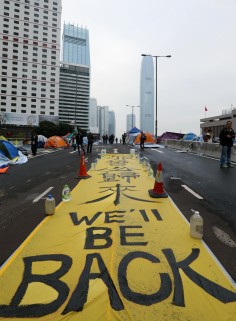
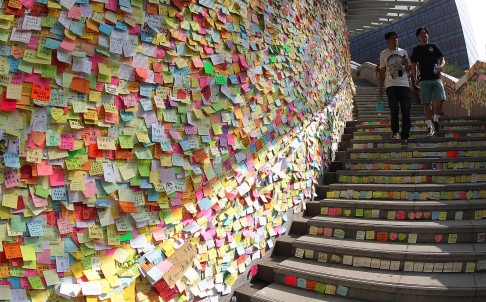
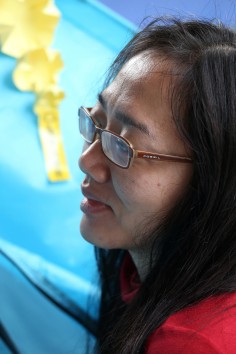
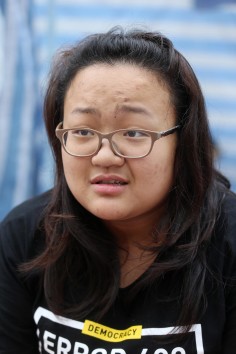
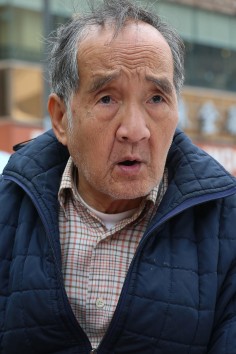
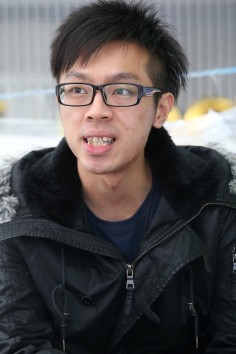
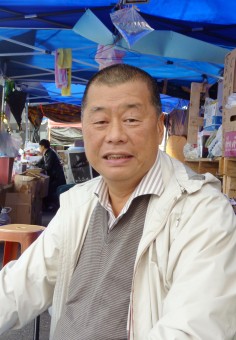
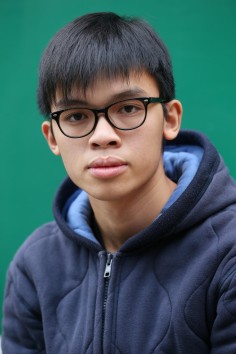
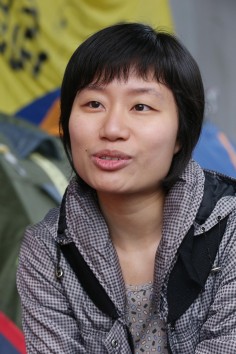
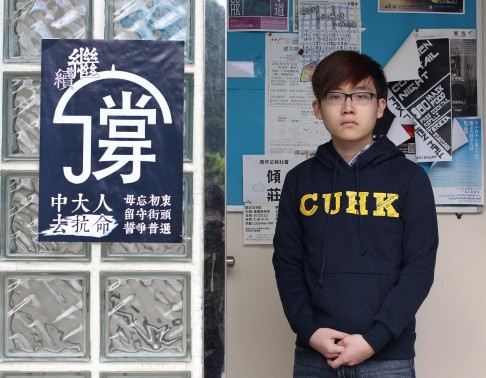
沒有留言:
張貼留言